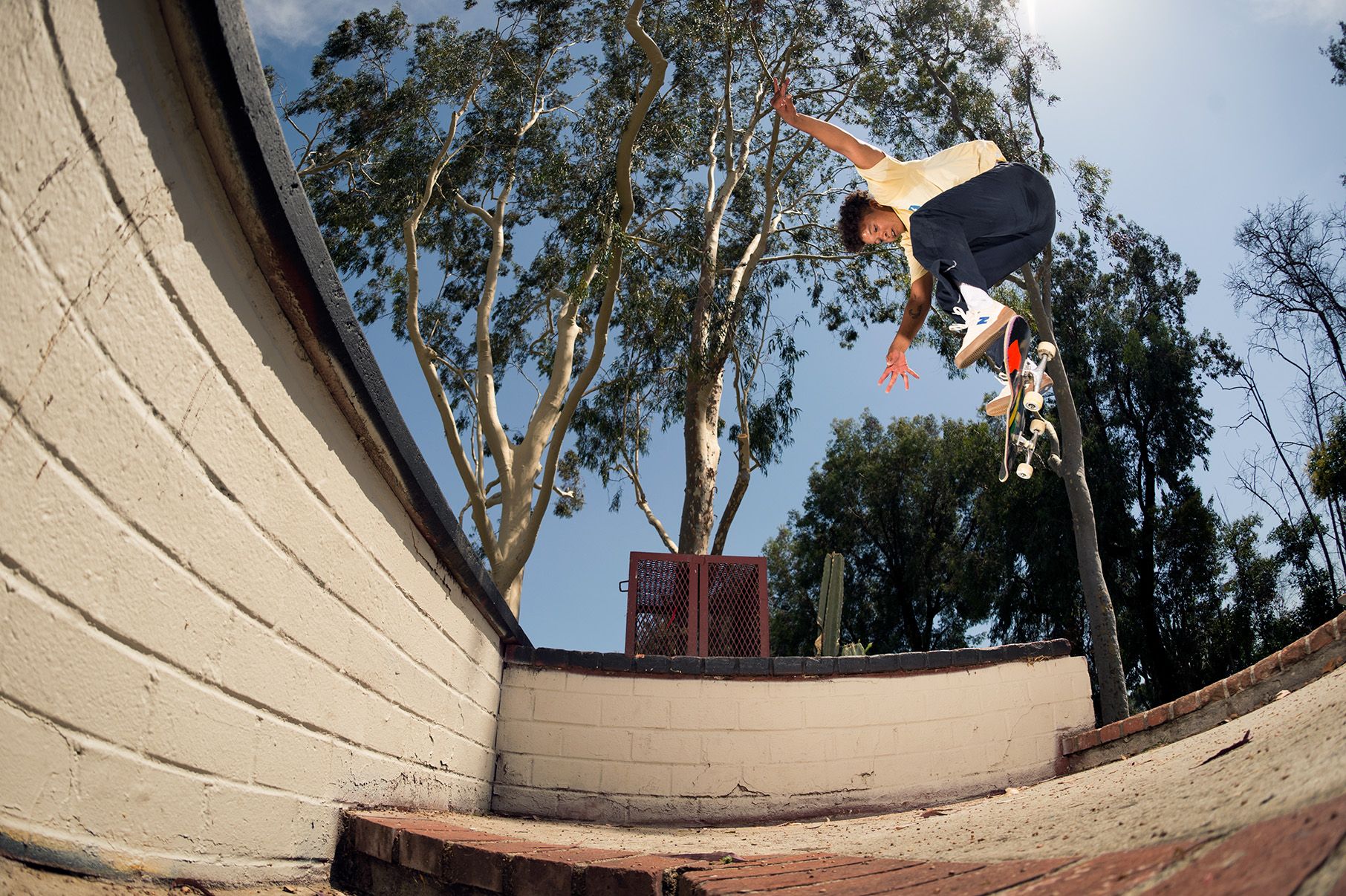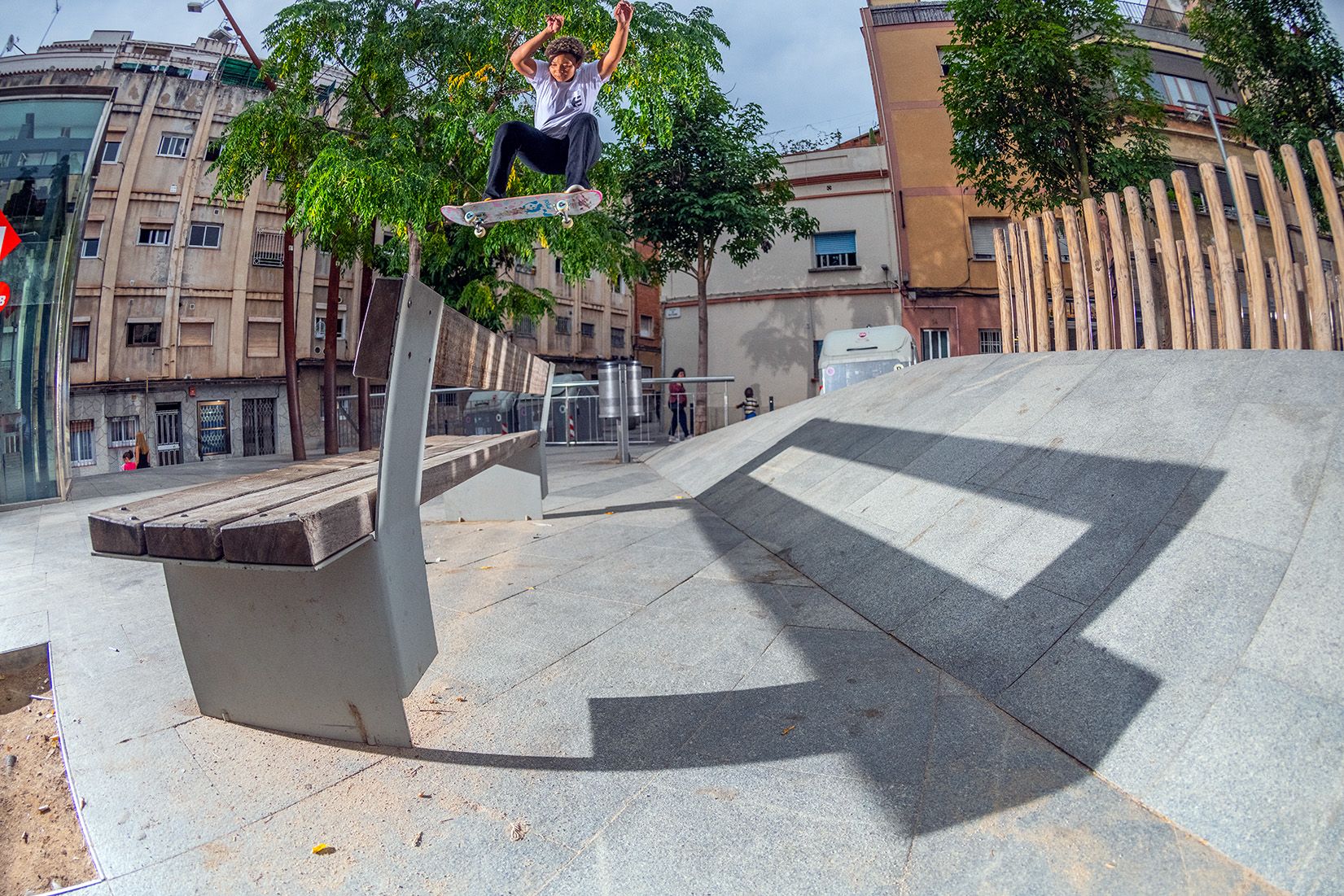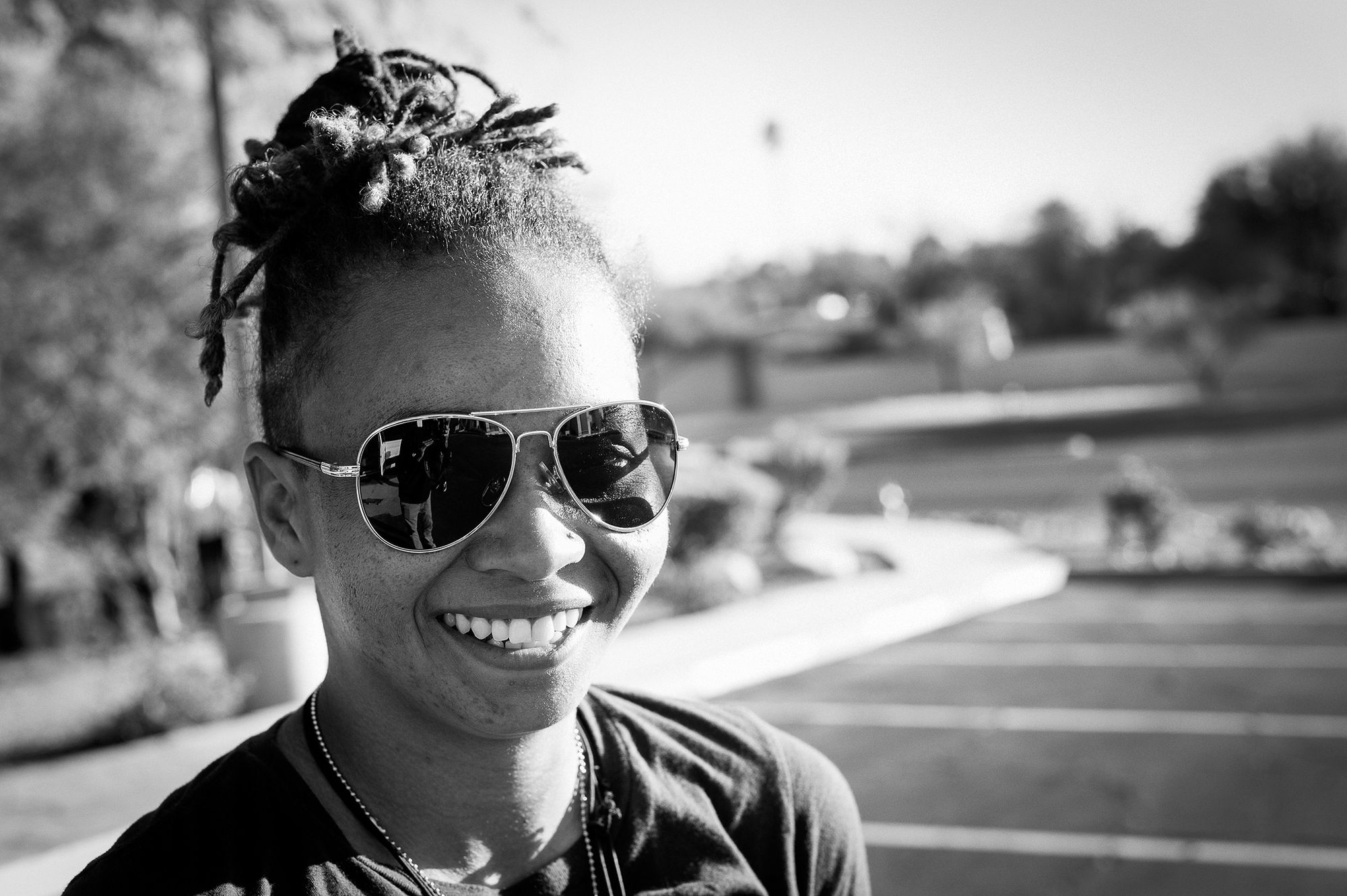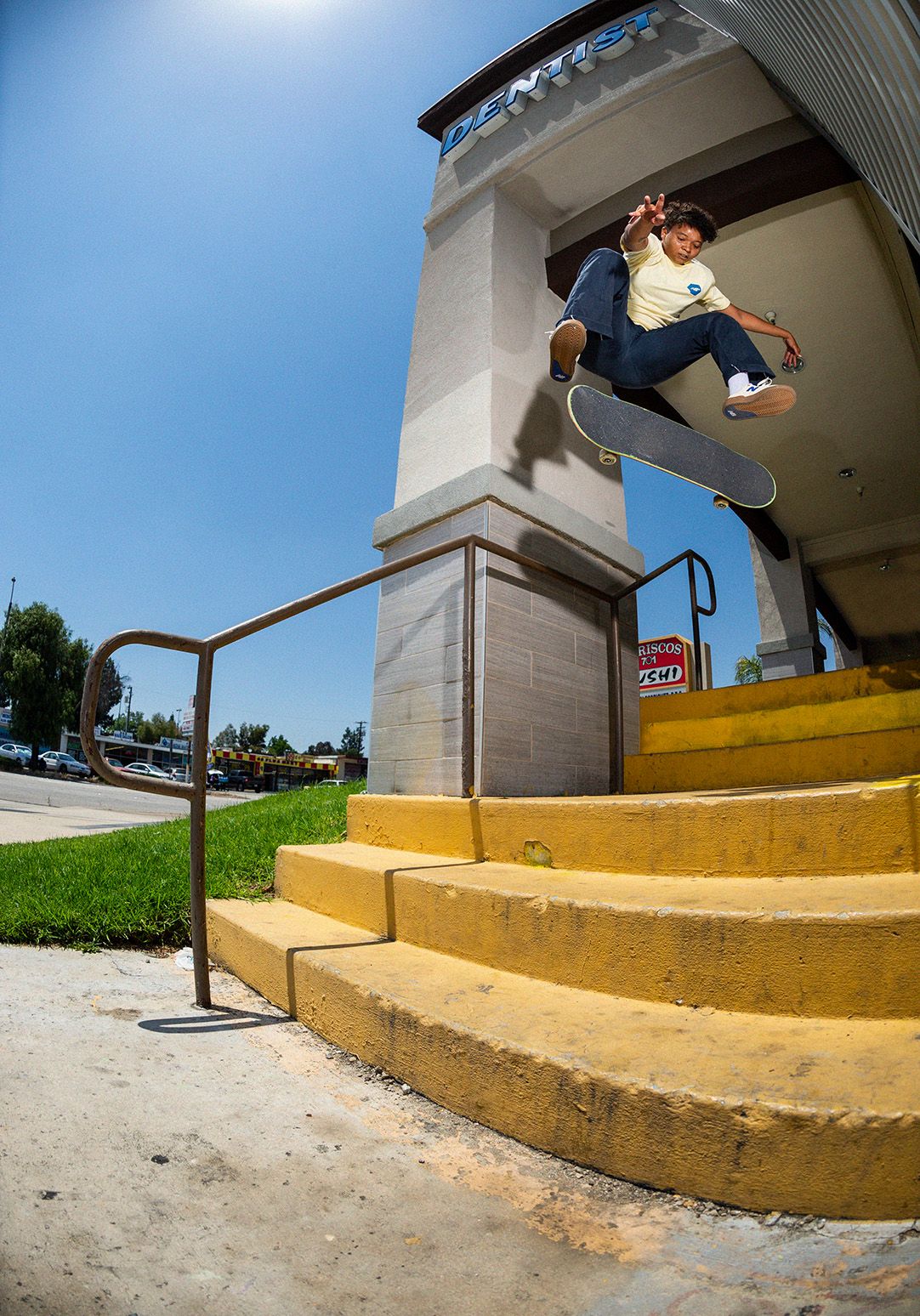It may have started in the living room of their modest Riverside, California apartment, where Samarria Brevard’s dad often had kung fu and action movies going. Samarria remembers Jackie Chan filling both the screen and her imagination.
There he was, sliding down a 21-story skyscraper! Freefalling off a cliff and onto a hot air balloon! Sling-shotting himself — in roller-skates — on a busy road, from one cruising car to another, then launching over a VW Beetle and oh my god, swerving under a moving semi!
No computer-generated imagery (CGI), no camera tricks. The danger and elegance were gripping.
“I wanted to be a stunt double,” Samarria says. “I wanted to do stunts.”

She was outside playing basketball, age 13 or so, when she saw her younger brother and a neighbor on the other side of the fence. That part wasn’t unusual. The kids in her complex always found themselves playing basketball or football, or racing each other down the long alleyway nearby.
But this time, the neighbor kid was messing around on a new skateboard.
“I saw him and my brother doing it, and it was a chain of events. I asked to try it, and it happened pretty quick. I was pretty natural on it. I could ride back and forth and turn and stuff, and that made it fun. I don’t know why that was so fun, but it was. Then I started seeing tricks and was like, ‘I want to do that.’”
Sixteen years later, she was on the cover of Thrasher magazine, her face silky serene as she was suspended in flight above a pedestrian handrail, just about to reunite with her board mid-air like it’s her magic carpet.
Samarria (pronounced Suh-MARR-ee-a) never envisioned being a professional skateboarder. But the endless challenge lit her up — tougher and more technical tricks always hovered out there, just waiting to be landed.
Mostly, though, it was a fun thing to do with her circle.
“It was mainly just a way to stay connected with my friends, something for us to do not only at the apartments, but we started branching out downtown and at skateparks.”
She didn’t know it then, but she was almost always carving new spaces for girls.
It didn’t matter which skatepark they hit. When they arrived and Samarria scanned the scene, every skater was male. She felt their stares and skepticism as she entered, and their respect by the time she left.
“You show up at a skate park and are entering skaters’ territory. I feel like I was lucky enough to have a group of people around me, my friends, who, no matter what, we’ve got each other’s back. But being good at it helped. They were surprised.”
Her skating style has been “all over the place,” as she puts it. She started at home and in the streets, then hit a nearby skate park with street obstacles and a “little” halfpipe every day, where she built her foundation.
Soon, her mom was driving her and her friends to other skate parks, and Samarria learned to skate different obstacles.
That makes it sound easy. In skateboarding, to learn is to crash. Hard. Those crashes never deterred her.

“I don’t really know why. I’m a glutton for pain or something. I think most of the time, most injuries are healable, and there’s something about wanting to land or learn a new trick that keeps pulling you, especially if you have friends who can do it. It pulls you to keep trying no matter what.”
That magnetism eventually led her to compete in organized skate contests, and that changed her life.
She first got the competition bug when her brother started attending contests at local parks as a teenager.
“That kind of got me sparked to try when the next one came up,” Samarria says. “I was skating a lot better, and I had a bag of tricks that I could put into use.”
When she was 16, she signed up for her first contest: a Gatorade tour event in Simi Valley, northwest of Los Angeles. That contest led to another, and before long, she met “all the women skateboarding at the time.”
One of those women was Lisa Whitaker, who founded Girls Skate Network in 2003 to support and grow women’s skateboarding worldwide. Whitaker introduced Samarria to girls-only contests in San Jose and other California communities —quite a revelation for a Riverside kid who always had to prove herself to the boys at the parks.
“I remember being the only one at skateparks, but when I stepped into that (contest) world, it was packed out. I was really surprised, ‘So there are girl skaters.’ There’s more possible than what I thought.”
So much more.
When Samarria was 17, she won her first contest: The Supergirl Am-Jam in Venice Beach, California, part of the Supergirl Jam series of skateboarding and snowboarding competitions to showcase top female talent.
Two years later, in 2013, she competed in the X Games in Los Angeles, placing fourth. The year after that came a monumental opportunity: The Kimberley Diamond Cup in Kimberley, South Africa.
It was not only her first international competition and first major win — she won the Women’s Street World Championships — but also her first time out of the country.

“It was a culture shock because it was a brand new skate park, but not too far away, people were living … it was not the best way of living. But also, that’s, like, up for debate because they could be loving it. You never know. Then there was this parade of luxury cars and people in the stands cheering them on. I didn’t know what to think of it, just so many walks of life in one place that are so drastically different.”
She kept going. Next, she placed second at the 2017 X Games — the first Black woman to medal at that event — and second again at the 2019 X Games. She has landed sponsorships and traveled the world for her sport. Norway, Portugal, Spain. Germany, France, Denmark. Sweden, Australia.
And then there was the January 2022 Thrasher cover. It’s mind-boggling for that kid from Riverside.
“If you’d asked me when I was younger, I never thought this would be the trajectory of my skate career.”
These days, Samarria lives in East L.A. and is working her way back to skating after a back injury that sidelined her for a year.
“I like to skate down stairs and stuff, and I’ve started jumping again. That’s a good sign for me. The physical part came back a lot faster than the mental part.”
She’s nurturing that mental part, in part by taking care of her body, training and focusing on nutrition—perfecting the vegan dishes that may make the menu of the cafe she hopes to open one day. (“I’m feeling like vegan breakfast doesn’t get done well enough. I’d have a really nice vegan breakfast sandwich.”)
But for now, it’s about building toward being the best skater she can be. Like those next-level tricks that keep her coming back, she knows that skater is still out there.
“I want to experience my best. I want to see what it looks like for me to really skate to the top-level game. I feel like I haven’t reached that point yet. I’m interested in seeing what that looks like.”

Along the way, she’ll continue to be a presence for skaters of all kinds and backgrounds, but especially girls. It’s exciting to see how far her sport has come since her early days.
“I feel like it’s going in the direction that I’ve always imagined — more girls skating, leveling up and showing what’s really possible. Breaking all those statements, you know, ‘girls can’t do this.’
"Now we’ve seen little girls showing if you put in the time and are dedicated enough, a lot is possible. I’m really stoked and excited to see what the next generations have for us.”

She helped kindle that momentum, of course, with her podiums and sponsorships and videos. It’s not something she’ll advertise or highlight, but when pressed about the path she’s opened for other girls, Samarria blushes and smiles as she bows and shakes her head.
“Sometimes I feel oblivious to it. It’s pretty rad to know that some people saw me skating and said, ‘She’s doing it, I can do it.’ That’s pretty rad.”